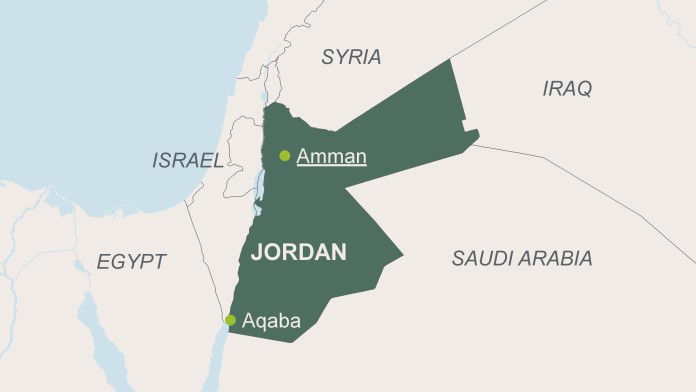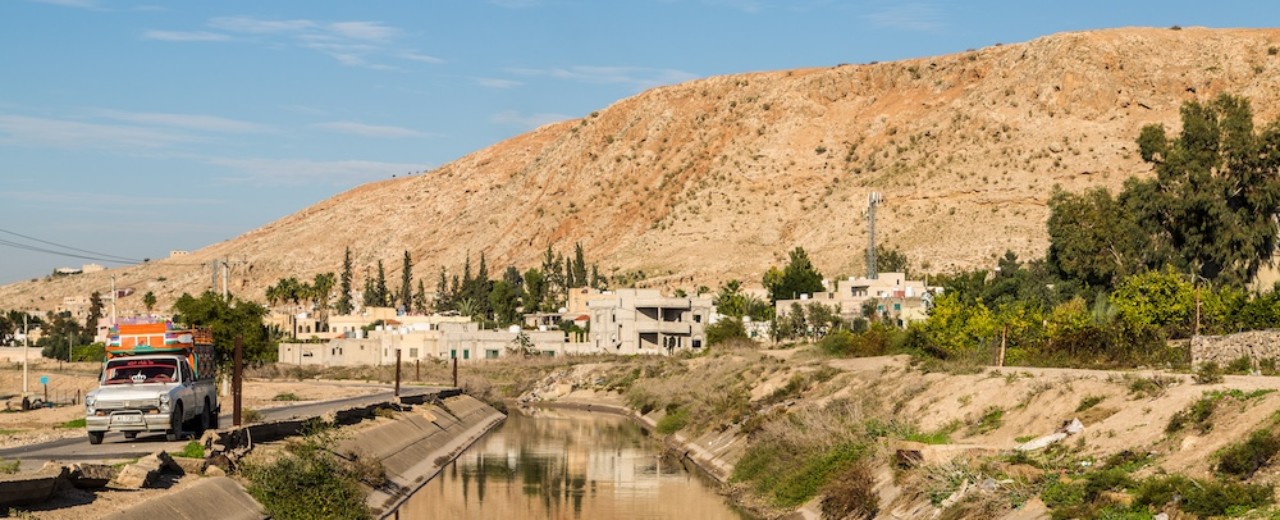
As of: 07/2024
Jordan is one of the most water-scarce countries in the world. At the same time, the limited available water resources are not used efficiently. The King Abdallah Canal, an important waterway for the Jordan Valley as well as the cities of Amman and Irbid, is old and dilapidated. This results in significant unaccounted for water. Commissioned by the German Federal Government, KfW is financing the comprehensive refurbishment of the northern part of the canal, which is important for the drinking water supply in Irbid and Amman. This will reduce unaccounted for water and secure the supply of drinking water to the population in the cities.
The 110-kilometre King Abdallah Canal serves to supply the cities of Irbid and Amman with drinking water and to irrigate the agricultural areas in the Jordan Valley. It covers a huge distance, running parallel to the Jordan river. A natural slope allows water to be transported. The canal was planned in 1957 and constructed between 1959 to 1961. However, the canal is now showing significant ageing damage. This is resulting in a significant quantity of unaccounted for water due to leaks. The canal is the largest body of surface water in Jordan, one of the world’s most arid countries. Here, groundwater resources have been overused for years and the scarce drinking water supply is not being managed efficiently. Climate change does the rest: precipitation patterns are changing, temperatures are rising, there are droughts, and surface water evaporation is increasing. All of this is further exacerbating water poverty. Refurbishment of the King Abdallah Canal would help protect scarce water resources and stabilise the drinking water supply for people in the Amman area.

Commissioned by the Federal Ministry for Economic Cooperation and Development (BMZ), KfW is supporting the comprehensive refurbishment of the King Abdallah Canal in its northern section with EUR 115 million, accompanied by a project by the US development organisation USAID. At the same time, the European Development Bank (EIB) is investing in the southern section, whose water is mainly used for agricultural purposes. Therefore, in a joint effort, the entire canal will be modernised. The section in which KfW is investing extends over 65 kilometres. A feasibility study was carried out to identify the preferred method for refurbishment. A new layer of concrete is to be applied over the entire length of the northern canal on top of the existing, damaged structure. This will secure the canal against leaks. Construction will progress in sections. Individual sections of the canal will be drained and the water will sometimes be diverted. This will guarantee uninterrupted use of the canal. The project also includes procuring equipment and machinery for the project-executing agency, the Jordan Valley Authority, so that it can effectively maintain the canal in the future. Measurement and control technology will also be installed so that the flow rate of the canal can be better controlled in the future. Photovoltaic systems will be installed at individual locations to generate electricity for the pumps that feed water into the irrigation networks for agricultural use along the canal.
The northern section of the canal, which serves the irrigation of agricultural land and the drinking water supply of Irbid and Amman, will have less unaccounted for water. At least 10 million cubic metres of water will be secured annually that would otherwise have leaked unused. This will stabilise the water supply for people in the cities of Amman and Irbid. The scarce resource water will be protected. Reducing the loss of water from the canal by at least 10% will also save energy, as there will be no need for energy-intensive seawater desalination in order to cover water deficits. This will indirectly save greenhouse gas emissions, as energy from fossil sources is also used for seawater desalination. The project will benefit in particular the around 6.7 million people in the Amman and Irbid metropolitan area, who receive some of their drinking water from the northern canal.
The project contributes to the achievement of these following United Nations Sustainable Development Goals:
KfW Group
KfW Development Bank
Middle East, Water and Climate
Share page
To share the content of this page with your network, click on one of the icons below.
Note on data protection: When you share content, your personal data is transferred to the selected network.
Data protection
Alternatively, you can also copy the short link: https://www.kfw-entwicklungsbank.de/s/enzB096L
Copy link Link copied